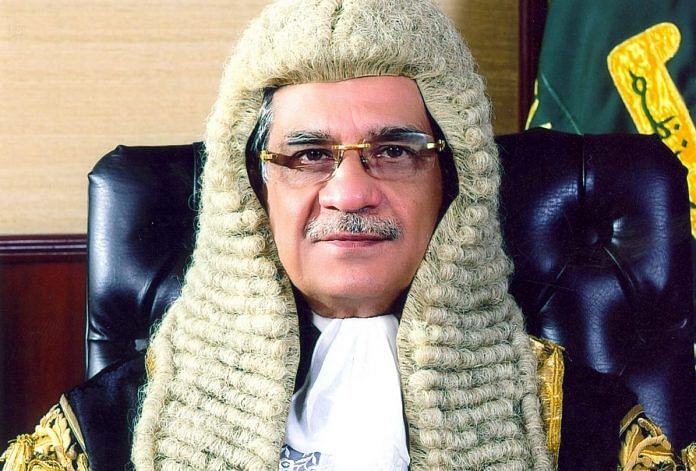Ahead of the national polls, the Supreme Court of Pakistan has been delivering some head-scratching orders.
The Supreme Court of Pakistan seems to be repeatedly overstepping the boundary that separates it from an elected government.
The most recent example of the top court’s problematic behaviour is the judgment it delivered Wednesday asking the general public to donate money for the construction of the Diamer-Bhasha and Mohmand dams. Not only that, it ordered the construction of dams to start immediately. Moreover, in what seems to be an attempt to look like the bigger person, Chief Justice of Pakistan Mian Saqib Nisar even announced he would donate Rs 1 million himself.
String of strange judgments
Just last month, the court barred private schools from charging fees for summer break – a practice prevalent in both India and Pakistan – saying it’s the state’s responsibility to ensure the provision of education to the poor, and it has ‘the mandate to take over the school’. The concept of privatisation, clearly, is yet to make sense to that country.
Pakistan’s judiciary also appeared to have a penchant for pettiness when it ordered the destruction of walls in Karachi built to display advertisements because they “plummeted (sic) the beauty of the metropolis”.
The icing on the cake was the Supreme Court’s decision to allow General Pervez Musharraf – the person who undermined and humiliated the judicial institution the most – to contest in the 25 July national elections. Musharraf, during his reign as President after a military coup, put Supreme Court judges behind bars when they moved against his declared emergency.
At the helm of all this is CJP Nisar, who last month in a fit of rage threw the mobile phone of a sessions judge onto a desk because the latter was unable to give a satisfactory reply to his questions. Opposing the CJP’s unprofessional behaviour, the Karachi Bar Association issued a stinging statement: “We consider that sporadic humiliation of judicial officers on live television may improve media ratings but not judicial performance.”
Nisar took oath as CJP in December 2016, six months before the court found Prime Minister Nawaz Sharif guilty in the Panama Papers case and forced him to step down. In February this year, the court barred Sharif from heading the PML(N), and in May, barred him from political participation for life.
Same theme at lower rungs too
This strange behaviour is not just restricted to the top court; lower courts too seem to be following suit in the run-up to the national elections.
The Islamabad High Court disqualified PML(N) member and foreign minister Khawaja Asif from holding public office for life as he had not declared that he held an ‘iqama’ or work permit for the United Arab Emirates. Former Prime Minister Shahid Khaqan Abbasi too was disqualified from contesting elections from his home constituency by an election tribunal, but the Lahore High Court overturned the decision.
All this is making the role of the judiciary in the national elections very interesting, especially given the caretaker government’s limited power and understanding of the functioning of the country, and the international pressure exerted by the Financial Action Task Force’s greylisting of Pakistan.
Nisar playing for post-retirement benefits?
The courts certainly have a strong role to play in any nation, but Justice Nisar – who will demit office in January 2019 – seems to be taking decisions with an eye on post-retirement plans benefits.
If Nisar is looking for bounty in retirement by improving his public perception, he is failing to realise that many have tried going down this route and failed – a prime example being former CJP Iftikhar Muhammad Chaudhry, who was ousted, arrested and humiliated by Musharraf, and is now set to fight (and lose) the election against Imran Khan from the NA-131 constituency.
Nisar is much like Chaudhry, wrote The New York Times. “Like Nisar, Chaudhry hoped to fix Pakistan and had a tendency to tell politicians and bureaucrats how to run the country,” it said.
Sushant Sareen, senior fellow at Observer Research Foundation, says that in Pakistan, there is a tendency among leaders to overstep their boundaries and act dictatorial.
What the Chief Justice of Pakistan should do is strengthen the institution; it is not the job of the courts to build or collect funds for dams.




Extremely well written. It seems that other big institution has recruited the court to do its bidding. Their lack of understanding of the international agreements and sovereign guarantee has put Pakistan on hook for 1.6 billion dollars for termination of rental power agreement with a Turkish company. I think it is time they rethink their role in day to day affairs of Pakistan.